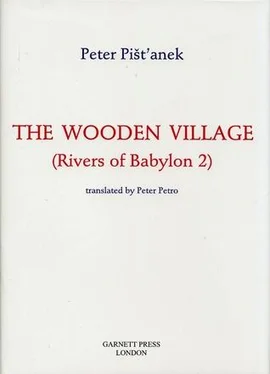Peter Pišťanek - The Wooden Village
Здесь есть возможность читать онлайн «Peter Pišťanek - The Wooden Village» весь текст электронной книги совершенно бесплатно (целиком полную версию без сокращений). В некоторых случаях можно слушать аудио, скачать через торрент в формате fb2 и присутствует краткое содержание. Год выпуска: 2008, Издательство: Garnett Press, Жанр: Современная проза, на английском языке. Описание произведения, (предисловие) а так же отзывы посетителей доступны на портале библиотеки ЛибКат.
- Название:The Wooden Village
- Автор:
- Издательство:Garnett Press
- Жанр:
- Год:2008
- ISBN:нет данных
- Рейтинг книги:3 / 5. Голосов: 1
-
Избранное:Добавить в избранное
- Отзывы:
-
Ваша оценка:
- 60
- 1
- 2
- 3
- 4
- 5
The Wooden Village: краткое содержание, описание и аннотация
Предлагаем к чтению аннотацию, описание, краткое содержание или предисловие (зависит от того, что написал сам автор книги «The Wooden Village»). Если вы не нашли необходимую информацию о книге — напишите в комментариях, мы постараемся отыскать её.
The Wooden Village — читать онлайн бесплатно полную книгу (весь текст) целиком
Ниже представлен текст книги, разбитый по страницам. Система сохранения места последней прочитанной страницы, позволяет с удобством читать онлайн бесплатно книгу «The Wooden Village», без необходимости каждый раз заново искать на чём Вы остановились. Поставьте закладку, и сможете в любой момент перейти на страницу, на которой закончили чтение.
Интервал:
Закладка:
“So your wife’s trail ends here,” said the other policeman. “You can take the car home now. But don’t worry, we’ll keep on searching,” he added reassuringly.
The young man needed a drink badly. He stopped by the counter and bought a double rum. He gulped it down. His insides went into a spasm; for a moment he didn’t know whether the rum would stay down, or come up. He chased it down with a lukewarm cola.
“Hey, Herr! Herr!” he was addressed, in a conspiratorial half-whisper, by a smallish man in a white coat, obviously someone who worked in the snack bar. Lady’s husband turned round. Since he was well dressed, the stranger had mistaken him for a German or an Austrian.
“Hey, Herr! Gute ficken!” the man continued, his eyes fearfully roaming. His right hand was hitting his left fist in an obscene gesture.
“Für eine Nummer zehn Mark! Eine Nummer hundert Schilling! Schöne Lady, verstehen? Kommen Sie, bitte! Gut Sex!”
That was too much for the husband. “I’m not interested,” he said in Slovak, leaving Feri Bartaloš standing there, dumbfounded by surprise and fear in the middle of the Wooden Village, as he left in disgust.
* * *
Martin’s parents have passed away; they both died in quick succession, while he was in the United States. His only sister still lives in Liptovská Osada. Martin writes to her sporadically.
One Saturday Martin decides to give this hopeless paper warfare a miss, gets into a rented Škoda Favorit and drives to Liptov.
First he drives to his native village, Liptovská Lužná, and pays his respects in the local cemetery to the somewhat overgrown family grave. He leaves his car parked by the church and takes a walk in the village. He meets a few passers-by, but nobody he recognizes. He stops at the house where he grew up, but strangers are living in it.
He takes a look at the low gate that he remembers from childhood, but a woman wearing gaudy plastic tracksuit bottoms comes out and gives him a stern look. Martin realizes that none of the original villagers are left; all the houses were sold to city people as holiday homes. But where the locals all went to remains a mystery for Martin.
Once in Liptovská Osada he makes for his brother-in-law’s house and finds that the ground floor has been turned into something like a boutique; a shop full of dubious unbranded electronic goods and souvenirs, and a video-rental shop that also sells cigarettes.
Jano, his brother-in-law, comes out to greet him; he’s recognized him easily. Jano immediately shouts to tell his wife to come out. Martin’s sister Naďa comes out and smiles. She hugs and kisses her brother. Jano shuts up shop and they take Martin to their living room. Martin brings the presents that he bought in Bratislava from the car.
Naďa introduces Martin to his two nieces, born after he left for the United States.
Then the discussion turns to money and business. Jano criticizes everything: the government, the Czechs, the Hungarians, the gypsies, and the weather. He is up to his neck in debt and his business is not going as well as he’d like. Both he and Naďa keep shop from morning till night, weekends too, and barely manage to make ends meet.
Martin hears them out with interest and then offers them a job in Bratislava in the future branch of Artisania Lamps. Martin knows that his sister and brother-in-law are reliable, hard-working, honest Slovaks. He is now founding a branch of his firm here, in Slovakia. He needs people that he can trust around him.
Jano and Naďa begin to demur. They don’t want to move. Despite everything, they’re doing fine. They have a nice house and their children have healthy mountain air to breathe. What would they do in Bratislava? They go there from time to time to buy stock, and that always spoils their entire day.
Martin tries to persuade them for a while, but fails.
Then it’s Jano’s turn to speak: he wants to ask Martin for a small loan. Something like a bridging loan; he hasn’t got the wherewithal to pay his supplier’s invoices.
Martin agrees. He won’t just lend them money, he’ll give it to them.
His sister and brother-in-law are pleased.
Yes, give, Martin continues. It’s his share of the money that Naďa got from selling their family house: that’s his gift. He is giving up his share in her favour. That’s all he can do for them. Even in America, money doesn’t grow on trees. He didn’t get rich by throwing money around. In fact, if he lent them a million, it wouldn’t help. You don’t have to be a financial genius to see that the money would be wasted. Martin took a little walk around the village. In this small village he counted six boutiques and four video-rental shops. And two shops selling cheap electronics. He’s not surprised business is bad. Motorists passing by on their way north are not going to buy a Walkman for four hundred, or rent a kick-boxing video-cassette.
The sister and brother-in-law pull a long face.
Martin continues: he wants to help them by getting them out of this hole and offering Jano a managerial position in his Slovak branch. That would be a proper job for a man! The branch would start from zero and it will be up to Jano how it looks and flourishes, say, in a year or two. He’ll also get a few per cent in shares, to increase his commitment. And Naďa can stay at home and look after the children. Jano will earn enough.
His brother-in-law explains: Martin’s firm in Bratislava will make lighting products and Jano knows nothing about that.
Martin laughs. Jano will be working in the sales department where it doesn’t matter whether they sell lamps or beef. Someone else will handle production. So what does he say?
Jano disagrees. He doesn’t want to be anybody’s employee. He wants to be his own man. That way, there’s nobody above him, just his customer. Our customer is our boss.
“Tell me honestly,” Junec asks, “when did you last see a customer in your shop?”
His brother-in-law shakes his head. No, never again will he work as an employee. And besides, there’s the insecurity he’d be taking on. At present he knows where he stands. It’s not much, but when Western tourists come back to the Tatra Mountains…
Martin is devastated by this stubbornness. “Why do almost all Slovaks think that being a businessman means buying a hot dog for three crowns, heating it and selling it for seven? The whole bloody nation is shifting the same hot dog person to person! Who’s going to manufacture products and goods? Where are all the craftsmen? Where are the skilled workers? Where the fuck did they go? We used to have great workers here. In the States they still remember the Slovak construction men and tradesmen. And here?” On his way from Bratislava he saw buildings so bad that in America they’d take the whole construction crew out, put them up against a wall and shoot them. And they’d put the architect in the electric chair. Damn fucking right!
Martin is sick with rage.
“Keep your hair on,” his amiable brother-in-law advises him.
Naďa, on the other hand, tries a softer approach. She doesn’t feel like moving, either. Maybe Martin doesn’t realize that what he managed to achieve in the United States, and more power to his elbow, he might not be able to achieve in Slovakia. What if his branch goes bust? What will she and Jano do then in Bratislava? Here, at least they have some security. But if the lamp business goes belly-up, what would they do then? Will Martin take them with him to the United States?
“That could be done,” Martin admits, now he’s driven into a corner.
But they don’t want to move anywhere, says Naďa. Not to Bratislava, nor the United States. They’re happy here as they are. Their roots are here.
Not a single word is said about the loan. Martin finishes his fruit drink and his open sandwich and quickly says goodbye.
Читать дальшеИнтервал:
Закладка:
Похожие книги на «The Wooden Village»
Представляем Вашему вниманию похожие книги на «The Wooden Village» списком для выбора. Мы отобрали схожую по названию и смыслу литературу в надежде предоставить читателям больше вариантов отыскать новые, интересные, ещё непрочитанные произведения.
Обсуждение, отзывы о книге «The Wooden Village» и просто собственные мнения читателей. Оставьте ваши комментарии, напишите, что Вы думаете о произведении, его смысле или главных героях. Укажите что конкретно понравилось, а что нет, и почему Вы так считаете.












